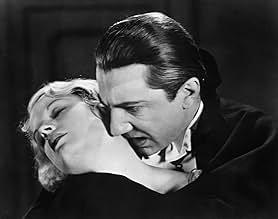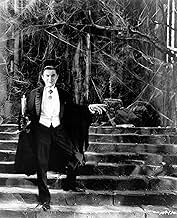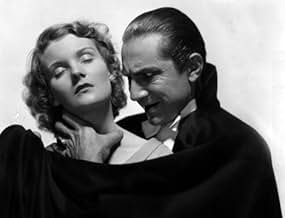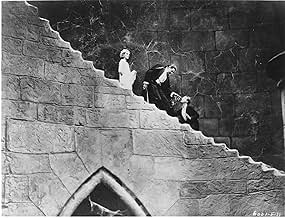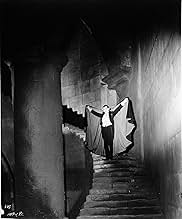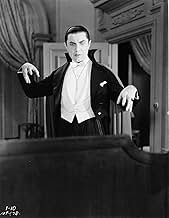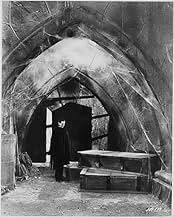ÉVALUATION IMDb
7,3/10
63 k
MA NOTE
Le vampire ancien et comte Dracula arrive en Angleterre et commence à s'en prendre à la jeune et vertueuse Mina.Le vampire ancien et comte Dracula arrive en Angleterre et commence à s'en prendre à la jeune et vertueuse Mina.Le vampire ancien et comte Dracula arrive en Angleterre et commence à s'en prendre à la jeune et vertueuse Mina.
- Prix
- 5 victoires et 3 nominations au total
Charles K. Gerrard
- Martin
- (as Charles Gerrard)
Anna Bakacs
- Innkeeper's Daughter
- (uncredited)
Bunny Beatty
- Flower Girl
- (uncredited)
Nicholas Bela
- Coach Passenger
- (uncredited)
Daisy Belmore
- Coach Passenger
- (uncredited)
William A. Boardway
- Concertgoer Outside Theatre
- (uncredited)
Barbara Bozoky
- Innkeeper's Wife
- (uncredited)
Tod Browning
- Harbormaster
- (voice)
- (uncredited)
Moon Carroll
- Maid
- (uncredited)
Geraldine Dvorak
- Dracula's Wife
- (uncredited)
Avis en vedette
This is the movie that set the horror genre into action. Sure there may be a few campy scenes that look like they might be out of some high school play production (the rubber bats and armadillos in Dracula's castle come to mind), but there is an unmistakable suspense and eerieness about the film. If you are lucky enough to find the DVD reissue from 1999, you have three great versions: the original 1931 version with basically no background music, the 1999 rescoring of the movie by composer Philip Glass, and the extremely interesting Spanish version, made at the same time as the original (with totally different actors). If you have this DVD, watch the movie twice: once with no soundtrack and once with the Glass rescoring.... totally different movie. Glass' score is great, but it doesn't really help the movie at all (it actually hurts it in many cases). But the utter silence in Browning's original just makes my skin crawl! The acting is actually quite great (Lugosi is, of course, phenomenal as is Dwight Frye as Renfield). The fear, the suspense, and, believe it or not, the sexuality, combines for a great movie that was an unbelievable success in its first release ($700,000 in it first US release, $1.2 million worldwide). Not bad for a movie made 72 years ago!
It's almost impossible not to love 'Dracula', a horror milestone that is the most important and influential vampire movie ever made. Bela Lugosi became a cinematic legend after this movie, and his portrayal of Dracula basically invented the modern vampire as we know it. Murnau's silent classic 'Nosferatu' was an obvious influence on Todd Browning, but while Browning was no James Whale (the innovative British director who made 'Frankenstein' for Universal a few months after this) he added a lot of his own style and ideas to the project, and Counts Orloff and Dracula are completely different kinds of creatures. Lugosi made his Count sophisticated, attractive and sexy, and this is what made this movie such a sensation at the time, and what helps make it still a wonderful viewing experience. Lugosi's performance is one of the greatest in horror history. Some of the other actors in the cast are a bit shaky but Edward Van Sloan as Van Hesling is excellent and Dwight Frye's Renfield (a different character from the book) is also memorable. Both actors would reappear in 'Frankenstein'. 'Dracula' is an important landmark horror movie, but even better, is still a fantastic viewing experience seventy years later. Don't just watch it because it's a classic, watch it because it's wonderful entertainment!
Dracula is a figure that is known by virtually all and can be credited in large part to this 1931 classic. Bela Lugosi who plays Count Dracula is horrifyingly creepy and finding a better Dracula would be nearly impossible. From the first encounter between Renfield and Dracula to the closing scene, the audience is on the edge of their seats and don't know what to expect, which is an essential part of most horror movies. I was a big fan of this film not only because it is an American classic but because it is a true horror film. In my opinion, too often in horror films today, the story itself isn't scary at all. The experience of going to the movie theatre with a huge screen and incredibly loud speakers help scare audiences by having things pop out when you are least expecting it. I believe that anyone can make a movie like that and is completely insignificant. The story behind Dracula is truly creepy and horrifying. A great story like this makes this one of the most significant horror films in history.
Bela Lugosi forever captures the role of a certain undead Transylvanian count who takes a trip to London in the first legitimate version of the classic Bram Stoker novel. Despite many attempts by many talented film makers, I believe this version, directed by Tod Browning, remains the definitive take on the often-filmed novel. But why? Is it simply nostalgia? Granted, I do fondly remember staying up late as a child watching this film on Ghost Host theater and finding myself suitably frightened. However, if I were the same age today, would I find the film as effective? Would a steady diet of more modern and explicit horror films made me too jaded to enjoy the more subtle charms of this film? I hope not, but I could see how it might. The film is slow, and its slowness is further emphasized by the absence of an under score. It is stagey - being as it was more influenced by the stage play than the novel itself. Also, the story plays itself out too quickly. Van Helsing manages to figure everything out and dispatch the count in about two seconds. There simply isn't much suspense - and even less gore or violence. Yet it remains the champ. Why? The main reason is Lugosi himself. He gives the performance of a lifetime. He truly inhabits the role and is genuinely creepy. The rest of the cast, particularly Edward Van Sloan as Van Helsing and Dwight Frye as Renfield, support him admirably. However, when I watch the old Universal horror films nowadays, I find myself really enjoying the atmospheric sets and lighting. Yes, there is still much to love about Dracula today. (As long as you avoid the optional Philip Glass score on the DVD!)
While Tod Browning's Dracula is not the definitive take on the most famous vampire of all time, it is possibly the most memorable one. This is not due to Browning's technical achievements or directorial wizardry, by ANY means. It is due to Bela Lugosi's career-defining portrayal of the title character. Born in what is now Lugoj, Romania, Lugosi brings to the part the flavor of his homeland, making him more believable as Dracula. This other-worldly aesthetic helped to make his performance what many consider the ultimate incarnation of Stoker's Dracula. Having played the Count in Hamilton Deane's Broadway version of Dracula, which started in 1927, Bela Lugosi was more than prepared for the role when it was time to commit it to film. Still struggling with the English language, however, he had to learn his lines phonetically. European accent in tact, he was able to deliver such memorable lines as, "I bid you welcome," "Listen to them. Children of the night. What music they make," and, of course, "I am Dracula." His performance alone is reason enough to watch this monster movie classic. If only the rest of the film was as spectacular as Lugosi. Dwight Frye's Renfield, while perhaps a little too over-the-top, is still another highlight to the film, and even Edward Van Sloan's Van Helsing is enough to challenge the might of Count Dracula. The rest of the film is rather flat to me. Now, I know it was made in 1931, and that, at the time, it horrified audiences, but I still stand by my opinion that the overall movie pales in comparison to Bela Lugosi's performance. Everyone else just seemed to be going through the motions, and it seems especially evident while Helen Chandler and David Manners are on screen. They just aren't convincing. I'm not saying that their performances ruin the film. It is still a classic, and certainly worth a viewing, but if you are in the mood for a vampire movie that is worthy of Bram Stoker's name, look no further than F. W. Murnau's Nosferatu. It is much more convincing and even scarier than Tod Browning's Dracula, despite being nine years older and silent. All in all, though, one cannot overlook the stellar performance of Bela Lugosi in the role he was born to play!
Le saviez-vous
- AnecdotesGenerally regarded as the film that kickstarted the horror genre in Hollywood.
- GaffesIn the scene where Van Helsing is attempting to catch Dracula's lack of reflection in a mirror, there are visible chalk marks on the floor showing Bela Lugosi where to stand for the shot.
- Citations
Count Dracula: This is very old wine. I hope you will like it.
Renfield: Aren't you drinking?
Count Dracula: I never drink... wine.
- Générique farfeluThe original title card has producer Carl Laemmle, Jr. identified as Presient (sic).
- Autres versionsA version of the film played on the 10/24/15 airing of Svengoolie (1995) featured a soundtrack taken from the French language audio track on the Dracula Blu-ray.
- ConnexionsAlternate-language version of Drácula (1931)
- Bandes originalesSwan Lake, Op.20
(1877) (uncredited)
Music by Pyotr Ilyich Tchaikovsky
Excerpt Played during the opening credits
Meilleurs choix
Connectez-vous pour évaluer et surveiller les recommandations personnalisées
Détails
Box-office
- Budget
- 355 000 $ US (estimation)
- Brut – à l'échelle mondiale
- 87 019 $ US
- Durée
- 1h 15m(75 min)
- Rapport de forme
- 1.20 : 1(original release)
Contribuer à cette page
Suggérer une modification ou ajouter du contenu manquant


